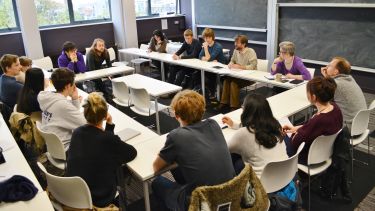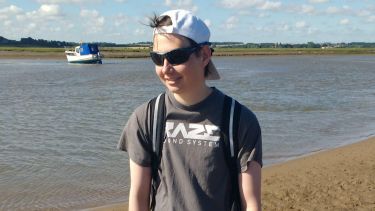Undergraduate teaching
School of Mathematical and Physical Sciences students learn in lots of different ways. You'll be introduced to key concepts in lectures, apply concepts in small group tutorials and workshops, and have the opportunity to contribute to research projects.

Lectures and tutorials
Lectures are a big part of university life, they are a chance to learn the fundamentals from recognised experts and get insights into the latest research. You'll also have small group tutorials and workshops to build on the topics you've covered in lectures and show you how to apply concepts to solving real problems. This is a great chance to see how the ideas in your lectures work in practice, ask questions about areas you're struggling with, and get extra support from our friendly academic staff.
Specialist teaching
Chemistry laboratory sessions
As part of our chemistry courses, you'll spend one day every week in the laboratory in first year and more time in second and third year. If you do a four-year MChem course, you'll join one of our research groups in your final year, and spend most of your time working in a team of professional chemists. The staff who run our teaching laboratories will take you from fundamental lab skills to conducting your own research experiments, and recording and analysing data from chemical samples you've prepared.
Physics and astronomy laboratory and computing classes
Physics and astronomy students are trained to build experiments from scratch and use essential experimental tools in our laboratory classes. We also teach you to use computers and computer programming throughout your degree. In your first and second year we have a series of weekly workshops that use Python and Labview languages to make measurements and analyse data. This could be observational data from a telescope, efficiency measurements from a solar cell or measuring the lifetime of cosmic muons. In your third and fourth year you can choose more advanced programming modules and learn LaTeX typesetting to help you with your research projects.
Mathematics and statistics programming classes
For some of our mathematics and statistics modules, you might have practical sessions to teach you how to use specialist mathematics software. This can include the statistical modelling package R, the programming language Python, typesetting using LaTeX, and website design using HTML and CSS, which are all useful skills to have on your CV.
Research projects
Chemistry
Chemistry students put their practical skills into practice with a research project in their third year. You'll gather and evaluate data, run your own experiments and present your findings. If you do a four-year MChem course, you'll spend most of your final year on a more advanced project, tackling a real research problem. You'll choose the topic, get specialist training from chemists working in one of our research groups and have access to state-of-the art equipment.
Physics and astronomy
Physics and astronomy students complete a research project in their third year. You can either do a Physics Research Project over one semester, or an Extended Project over the whole of your third year. If you do one of our MPhys courses, you'll do a more advanced research project in your final year. You'll be based in one of our research laboratories, working alongside professional scientists and have access to state-of-the-art equipment.
Mathematics and statistics
Lots of mathematics and statistics modules include mini-research projects that give you the chance to put your knowledge into practice, and see a complex problem through from start to finish. You can also complete a teaching project with local schools through our Undergraduate Ambassadors Scheme. If you do one of our research-intensive MMath degrees, you'll spend a third of your final year working on a major independent research project. This will prepare you for a career in research, with training on how to write mathematical reports and present your findings.
Research experience
Each year undergraduates can apply to join the Sheffield Undergraduate Research Experience scheme. This gives you a bursary to spend around 6 weeks working with one of our research groups over summer.
You'll be able to get first-hand experience of major research projects and can even lead to your name appearing in an academic journal, which can help you stand out when you’re applying for jobs.
Mathematics and statistics students can also apply to schemes such as the Undergraduate Research Internship. This has a focus on students from backgrounds and with identities that are typically underrepresented in mathematical research. These include, but are not limited to women, people with a disability, people who identify as LGBTQ+ and people in BAME communities.
Jai Schrem, Mathematics MMath
"I'm really happy I was able to complete a short supervised reading project this summer, because it gave me the chance to broaden and deepen my knowledge of group theory and try some challenging problems. Presenting one of the new concepts I learned was also a great opportunity to practice explaining mathematics to an audience and improve my presentation skills."
Field trips and placements
(For physics and astronomy students)
Through our network of global partners, our physics and astronomy students have opportunities to visit leading labs and facilities like the Large Hadron Collider at CERN, the Isaac Newton Group of Telescopes in the Canary Islands, and the dark matter research facility at Boulby Underground Laboratory.

International undergraduate scholarships
We are offering scholarships of £2,500 for each year (subject to a 60% average) of your undergraduate degree. The maximum value is £10,000 for four-year programmes.

